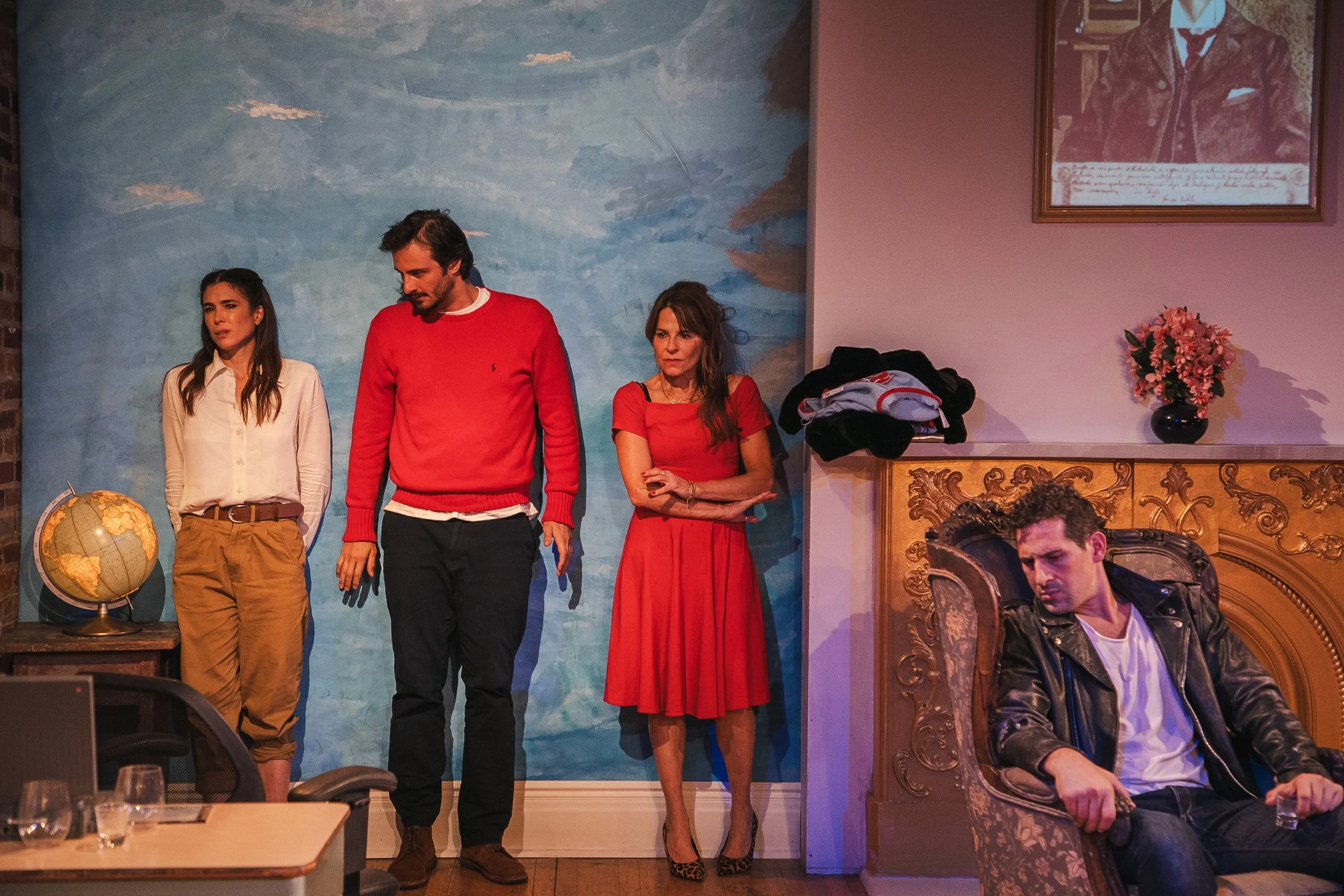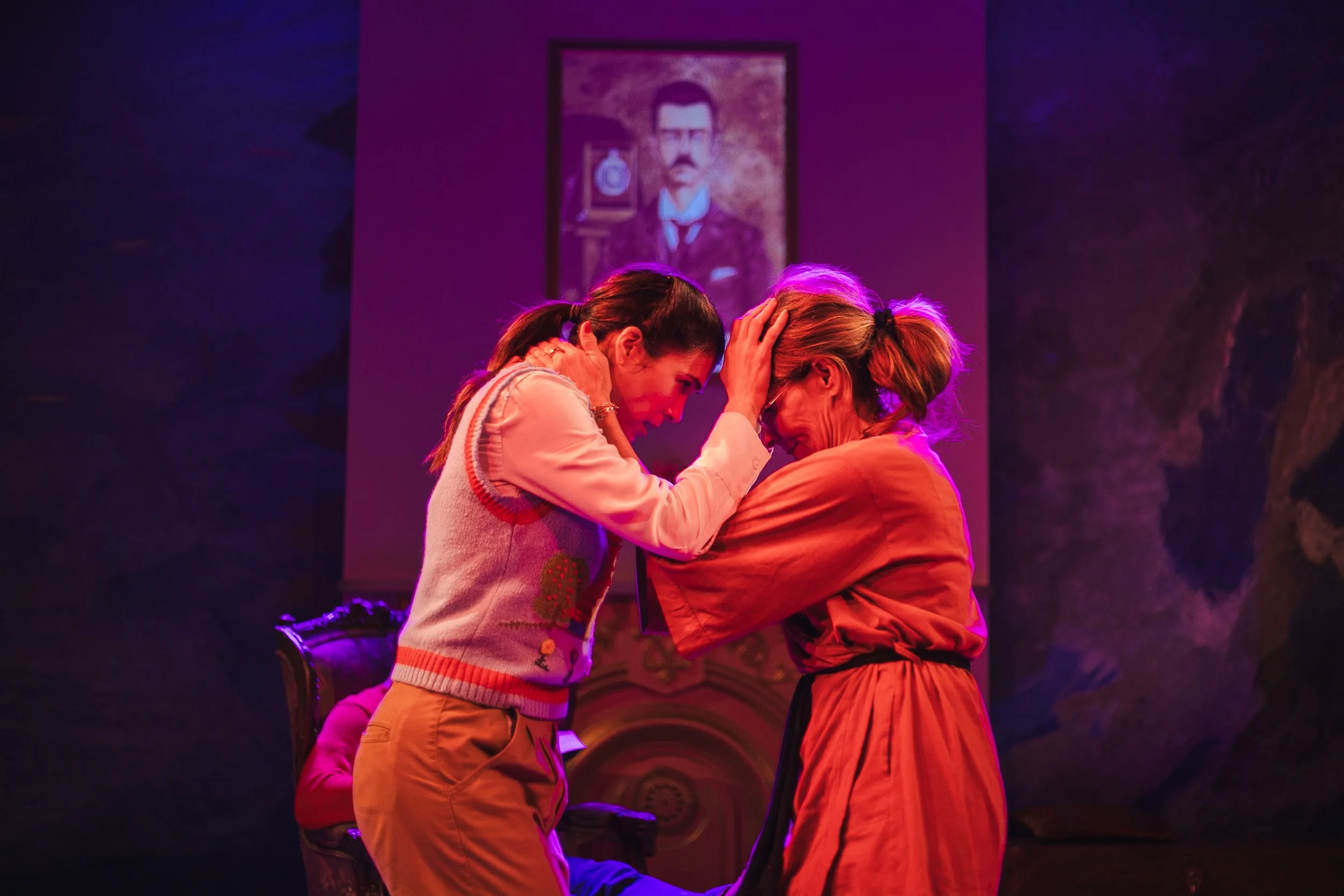Show Response: The Whole of Time
by Reuven Glezer
Mother, brother, sister, gentlemen caller - Romina Paula doesn’t so much as replay this dramatic quartet as reimagine it in new dimensions in her Buenos Aires remix of The Glass Menagerie. Calling it an adaptation feels trite, as it’s more of an ode to the original work’s bones (to be hashtag current, see Spike Lee’s Highest to Lowest in conversation with its source material, Kurosawa’s High and Low).
Ben Becher, Ana B. Gabriel, Lucas Salvagno and Josefina Scaro / photo: Catalina Recalde
Paula’s play, and by extension Jean Graham-Jones’ translation and Tony Torn’s production, retains an ethereal warmth in its measures and its concerns; a shrine to Frida Kahlo greets us as we enter the Brick, and her work shadows the play like a guardian spirit. Andromache Chalfant & Rebecca Lord-Surratt’s scenic work for the production recalls a stateliness in how lived-in the Buenos Aires apartment feels, and Jay Ryan’s homey lantern lights give it that kind of picturesque ghostliness. I can only imagine the effect was strongest at its original venue, Torn Page, which is both Torn’s townhouse and a performance venue, but the Brick’s, well, brick walls and wooden floors only add to the allure.
And then - bam! - we open with a karaoke rendition of a Mexican pop star’s number one hit about the woman he murdered and we’re in the middle of the sibling dynamic between Antonia and Lorenzo. Dan Safer consulted on the movement, itself a treasure, which adds lovely wrinkles to the work’s painterly energy. In many ways, watching The Whole of Time feels like witnessing a series in an artist’s renditions of a difficult family line, one where love is tendered by instability. Matriarch Ursula (why don’t we name characters Ursula anymore?) is all cold heat until alcohol loosens her lust and vitriol. She wants Lorenzo to tell his beloved sister that he’s planning on leaving - an insistence that gains new relevance when the family unit ends up in a merry-go-round of frustration later on.
But before all that lust and carnival riding, we’ve got Maximiliano, Lorenzo’s buddy from work, coming by to hang out and unintentionally become the thing that breaks the chain. He’s comparatively lowborn compared to the rest of the clan, but he’s got curiosity and moves (another gem is his big moment to a Stooges track that’s the highlight of Safer’s movement work). Left alone with Antonia, his questions about her contentedness grow into a gateway - for himself, her newfound desires, and for the family tree to wither.
My only quibble about the show is I wanted to live in this Williams' mutation for longer. I wanted longer asides about Basque. I wanted to see what happens to Maximiliano after he's left the clutches of this strange family. I wanted to know if Lorenzo really does want to go to Spain. Though perhaps there’s something in Tennessee that makes you watch the smoke fade as you want another taste of the cigar.
But what you should see is how Ursula becomes a whole other animal when there's new flesh to toy with. How the kindness, a snooty, cold kindness, dries like old snot when there's another chance at sucking a soul dry. She's the cultured matriarch of a cultured family, who talk about the kind of liquor they drink and their ancestors’ place of origin like fine vintages. What's the point of all this spiritual accumulation? Who's to say when your son, who you love a little too much, is leaving you behind with the eccentric daughter you don't love enough?
Lorenzo is reading Moby-Dick when Maximiliano walks through the door. And like in that great tome of ships & sea, there's not a world left when our obsessions and lives sink down into the waves and become lost to scavengers. At best, like the play’s first family, we might hope to cling to driftwood and be lifted home by passing strangers.
Ana B. Gabriel and Josefina Scaro / photo: Catalina Recalde
The Whole of Time runs through September 20th at The Brick Theater.


